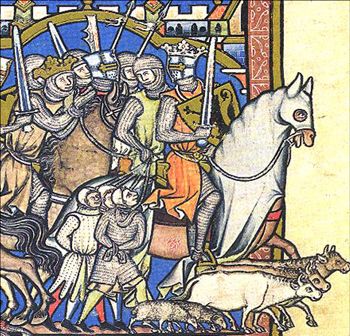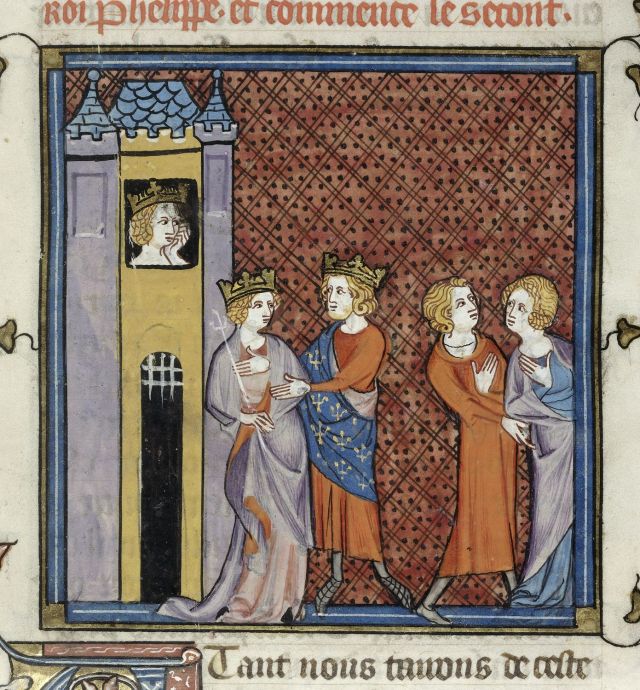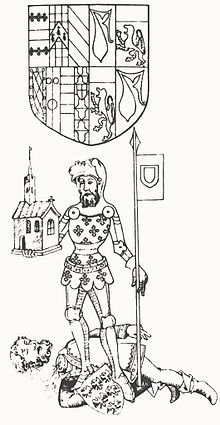The murder of Piers Gaveston, lover and confidant of Edward II on 19 June 1312 is well known to many. The story of his rise to the earldom of Cornwall, and subsequent clash with the mainstay of England’s nobility is also well documented.[Click here for:- Piers Gaveston: Life, Love & Death (An Overview)] But one of the most intimate accounts comes from the pages of the Vita Edwardi Secundi (The Life of Edward II), written by a contemporary at the court of Edward II, and later in the household of his brother-in-law, the earl of Hereford. Quite possibly a senior clerk, John Walwayn, was well placed near the centre of government to have an intimate grasp of the politics and machinations of the court, not to mention the hearsay and gossip, during this dramatic period in English history. The Vita is our most detailed source of the reign. While the author certainly did not favour Gaveston, and adds in verbatim comments that often seem unlikely, overly dramatic and give a calculated edge to his narrative, the account is, when corroborated with others, one of the best pictures we have of this dramatic episode in Edward II’s reign.
Having outlined Gaveston’s surrender at Scarborough Castle and Edward II’s subsequent negotiations with the earl of Pembroke and others [Click here:- A Lesson in Loyalty: The Life of Aymer de Valence, Earl of Pembroke (Part One)] to take Gaveston south to Wallingford under Aymer’s protection, the account follows on;
‘The earl was delighted by this capture and without consulting his fellows, but on his own initiative, took Piers, accepted the condition, and pledged his lands and tenements to the king under the said form for Piers’ safety. Now the king knew of this, because the matter had been put forward by his counsel. He hoped to give Piers adequate support before the said term: because if Piers could have waited until August [when Parliament was due to meet], he would have recovered, it is said, his personal freedom. For the Pope and the King of France would have appointed a remedy because the King of England would have given them Gascony in fee.

Thus earl Aymer left the North, and with Piers in bonds as his prisoner made for the heart of England, and when he had gone about five days’ journey or more, coming at length to the county of Northampton [9 June], he sent for Piers and said, ‘You are tired from the journey, and need rest; there is a small village near here, a pleasant place with ample lodgings. I am going off on certain business for a time; stay there till I come.’ Piers gratefully accepted the earl’s offer; and he sent him to this village [Deddington, Oxfordshire] under guard; but the earl never saw Piers again in England.
When the earl of Warwick learned all that was happening in this matter, he took a strong force, raised the whole countryside and secretly approached the place where he knew Piers to be. Coming to the village very early one Saturday [10 June] he entered the gate of the courtyard and surrounded the chamber. Then the earl called out in a loud voice: ‘Arise traitor, thou art taken’. When Piers heard this, seeing that the earl was there with a superior force and that his own guard did not resist, he dressed himself and came down. In this fashion Piers was taken and led forth not as an earl but as a thief; and he who used to ride on a palfrey is now forced to go on foot.
When they had left the village a little behind, the earl ordered Piers to be given a nag that they might proceed more quickly. Blaring trumpets followed Piers and the horrid cry of the populace. They had taken off his belt of knighthood, and as a thief and a traitor he was taken to Warwick, and coming there was cast into prison. He whom Piers called Warwick the Dog [or the Black Dog of Arden] has now bound Piers with chains.
Piers therefore was kept in prison, but earl Aymer without delay made intercession for him with the barons. As soon as he knew that Piers had been captured he approached the Earl of Gloucester, beseeching him with tears to vindicate the wrong that had been done to him, and at all costs to restore Piers to him. For, he added, unless the earl would help, he would suffer eternal disgrace, and lose the lands which he had pledged. The Earl of Gloucester is said to have replied thus: ‘My lord earl, the wrong done to you is not to be imputed to Earl Guy [Warwick]. He did this with our aid and counsel; and if, as you say, you have pledged your lands, you have lost them anyhow. It only remains to advise you to learn another time to negotiate more cautiously.’ When the earl saw that his prayers were thus rejected, he departed in confusion and came to Oxford. To the assembled university he explained his cause, and had a copy of his pledge read to a joint meeting of clerks and burgesses. He laid his pleas before them, either that they might lend their aid and counsel in recovering Piers, or that they might show the justice of his cause in case anyone should think otherwise. For he was suspected by some of having guilefully countenanced so unfeeling a crime, in order to hand over to death more easily one whom perhaps he would not have captured by lengthy siege. But neither the clerks nor the burgesses cared to take up or discuss a matter that did not concern them.

On a day not long after the capture of Piers, the remaining earls met at Warwick and after discussing Piers’ death they at length decided that on account of his kinship with the Earl of Gloucester he should not be hanged as a thief nor drawn as a traitor, but should suffer the penalty of beheading as a nobleman and Roman citizen. The Earl of Warwick sent a sharp-tongued messenger to Piers, telling him to look to his soul, because this was the last day that he would see on earth. When the messenger, hastening with his message, reached Piers, he said ‘Look to yourself, my lord, for this day you shall die the death’. And Piers when he heard the word death sighed a little and groaned: ‘Oh! Where are the presents that bought me so many friends and with which I had thought to have sufficient power? Where are my friends, in whom was my trust, the protection of my body, and my whole hope of safety; whose lusty youth, unbeaten valour, and courage was always aflame for hard tasks? They had promised to stand by me in war, to suffer imprisonment, and not to shun death. Indeed my pride, the arrogance that one single promise of theirs has nourished, the king’s favour and the king’s court, have brought me to this sorry plight. I have no help, every remedy in vain, let the will of the earls be done [19 June].
About the third hour Piers was led forth from prison; and the Earl of Warwick handed him over bound to the Earl of Lancaster, and Piers, when he saw the earl, cast himself on the ground and besought him, saying, ‘Noble earl, have mercy on me.’ And the earl said, ‘Lift him up, Lift him up. In God’s name let him be taken away.’ The onlookers could not restrain their tears. For who could contain himself on seeing Piers, lately in his martial glory, now seeking mercy in such lamentable straits. Piers was led out of the castle and hastened to the place where he was to suffer the last penalty; and the other earls followed at a distance to see his end, except Count Guy [Warwick] who remained in his castle.

When they had come to a place called Blacklow, which belonged to the Earl of Lancaster, an envoy from the earl ordered that Piers should remain there; and immediately by the earl’s command he was handed over to two Welshmen, one of whom ran him through the body and the other cut off his head. When the business had been thus despatched the earls again went their ways. The Dominican Friars gathered up Piers, and sewing the head to the body they carried it to Oxford; but because he was excommunicate they dared not bury the body in the church.
Such Peter’s [Piers] end, who, climbing too high
Crashed into nothingness from whence he came.
See how Piers who had lately been more notable than the rest of the King’s hall, now for his insolent behaviour lies beheaded by order of the Earl of Lancaster. Let English courtiers beware lest, trusting in the royal favour, they look down upon the barons. For they are a chief constituent of monarchy, and without them the king cannot attempt nor accomplish anything of importance. Therefore those who vilify the barons assuredly despise the king and show themselves guilty of treason.’ (1)
The murder of Piers Gaveston was to have a profound impact on the subsequent reign of Edward II, the king never forgiving nor forgetting the murder of his lover. For the next ten years in particular, Edward would take every opportunity to outmanoeuvre his opponents, leading in the end to the destruction of the Blacklow earls in the spring of 1322, and the deaths of Hereford and Lancaster. Warwick died of natural causes in 1315.
Further Reading
Click here: A Royal Traitor: The Life & Execution of Thomas of Lancaster
Click here:- Isabella: Wife, Queen, Rebel (Part One)
Click Here:- A Lesson in Loyalty: The Life of Aymer de Valence, Earl of Pembroke (Part One)
Click Here: A Solemn Affair: The Funeral of Piers Gaveston, 2 January 1315
Piers Gaveston, Earl of Cornwall, 1307-1312: Politics and Patronage in the Reign of Edward II. J.S Hamilton. (Detroit & London, 1988)
Stephen Spinks is author of ‘Edward II the Man: A Doomed Inheritance‘ available here at Waterstones Amazon Foyles Amberley Publishing
Notes
(1) Vita Edwardi Secundi, ed & trans N. Denkolm-Young (London, 1957), 24-9
Facebook: Fourteenthcenturyfiend
Twitter: @SpinksStephen
One thought on “The Murder of Piers Gaveston: A Fourteenth Century Account”